#Traffic
Canada: Speed Limit Signs Inadequate Near Camera Trap
Activists in Winnipeg, Canada yesterday charged city leaders with using photo radar to exploit a hard-to-see sign used to provide notice of a change in the speed limit. To make its case, WiseUpWinnipeg broke out a copy of the official regulations governing signs, the Manual of Uniform Traffic Control Device (MUTCD) for Canada, to determine whether the speed limit signs were placed in accordance with national standards. The group concluded that several of the signs are substantially out of compliance.
Virginia House Makes Rolling Right Turn Reckless Driving
The Virginia House of Delegates and a state Senate committee approved legislation that would make a rolling right-hand turn on a red light a reckless driving offense. On Thursday the Senate Transportation Committee unanimously approved a bill introduced by Delegate Bill Janis (R-Glen Allen) which the lower chamber had approved by a 67 to 31 margin on February 4.
“Any person who drives a motor vehicle in violation of Section 46.2-833 is guilty of reckless driving,” House Bill 1993 states.
Italy: Speed Camera Gives Economy Van 764 MPH Ticket
The owner of a family van was surprised to receive a ticket in the mail from police in the southern Italian town of Oria accusing him of driving 1230 km/h (764 MPH). The Lizzanello resident had been driving his Fiat Doblo on the SS7 in the province of Brindisi on November 6 and weeks later received a letter demanding that he pay 165 euros (US $223).
Italian tickets allow a five percent tolerance to account for the possibility of error. At 1230 km/h, the motorist exceeded the 90 km/h (56 MPH) speed limit with an adjusted velocity of 1078 km/h (669 MPH), according to the notice signed by two officers ( view ticket). Oria police insist that the camera managed by the private firm Sodi Scientifica SpA is perfectly accurate. Officials blamed the incident “clerical error” in a statement issued Thursday.
Federal Court Upholds DUI Jailing of Sober Man
The Eleventh Circuit US Court of Appeals on Tuesday saw no problem with jailing a man for eight hours after he blew .03 on a breathalyzer — far below the legal limit. Santa Rosa County, Florida sheriff’s deputies had arrested Roger A. Festa on the charge of driving under the influence of alcohol (DUI) on April 9, 2005. Since he had been entirely sober, Festa sued Deputy Adam Teichner and Deputy Douglas Burgett for unlawful arrest.
South Carolina: AAA Endorses Illegal Speed Trap
A century ago, the forerunners of the American Automobile Association (AAA) provided a service that warned motorists about upcoming speed traps. AAA Carolinas turned away from this history and used its considerable influence on Monday to support a speed trap declared illegal by South Carolina’s attorney general and several of its lawmakers. Since August, the tiny town of Ridgeland has allowed a private company to operate a speed camera on Interstate 95 in direct defiance of a state law enacted in June specifically to stop the program ( view law).
“All branches of government are facing constricting budgets,” a AAA Carolinas statement explained. “Law enforcement agencies will not be able to simply add staff to handle the growing traffic volume and therefore must look to creative solutions to do more with less. This photo-radar enforcement program in the Town of Ridgeland is one such example and should be replicated as opposed to rejected.”
Does Speed Save?
A recent report from High Road Auto Research [ full report in PDF here] finds that
It has been consistently found that the higher a vehicleʼs travel speed (even when driving at or under the legal limit), the greater the focus of the driver on their surroundings. The increased perception of danger triggers an increased endocrine reaction within the brain. This, in turn, forces the individual to play closer attention to objects in motion around the vehicle. Even relatively small changes in vehicle speed can result in substantial increases in spatial acuity and response time.
On the surface the report seems to be trading in truisms: after all, who would argue that higher speeds don’t trigger faster stimulus responses in drivers? But how does that apply to the real world of highway safety legislation and speed limits?
Michigan Appeals Court: Anonymous Tip Justifies Traffic Stop
Anonymous informants may direct police to pull over any motorist regardless of whether the other driver has committed any traffic offenses under a ruling handed down by the Michigan Court of Appeals last week. The state’s second highest court reversed the finding of a circuit court that had insisted on police officers having probable cause before initiating a traffic stop.
The court considered a March 17, 2008 incident in which Michigan State Trooper Christopher Bommarito was on patrol in the city of Southgate. As Bommarito was heading out of a parking lot, a woman behind the wheel of a red pickup truck pointed at a nearby car and mouthed the phrase “almost hit me.” Bommarito immediately activated his siren and entered into hot pursuit. He had no other information aside from the point when he pulled over Shaun David Barbarich who was later arrested for drunk driving.
Maryland Appeals Court Forces Cops to Pay Camera Tickets
The Maryland Court of Appeals ruled on January 24 that officers who received speed camera tickets while driving police cars on duty must pay the $40 fine. Montgomery County Officers Dean Cates, Randy Kucsan, Bill Tran, and Dana Way protested after their department reissued citations in their names in 2008. They were found guilty in district court, but a circuit court judge dismissed the charges on the grounds that the officers were denied their due process rights. The state appealed, hoping the court would rule that police officers are not entitled to due process before liability for a speed camera ticket is transferred.
Under county policy, speed camera tickets are re-issued to the policemen, paramedics and firemen who were behind the wheel of police cars, ambulances and fire trucks if the emergency lights on the vehicles were not visibly activated in the photograph. The officers complained that their sergeant would ask them weeks or months after an alleged offense to explain why they were speeding.
Opinion: Flaws in Insurance Institute Traffic Camera Study, Part 2
The Insurance Institute for Highway Safety spent all of yesterday touting its report on the effectiveness on red light cameras as if it were the most “comprehensive” study available on the topic. The group emphasized the effects cameras would have had on one hundred of America’s largest cities, but the report itself only looked at accident numbers in fourteen out of the 500 jurisdictions that have active photo ticketing programs. Industry researchers did not even know how many red light cameras were in use in the locations studied.
“Attempts were made to obtain historical information on the number of red light cameras in the study cities, but information on the scope of red light programs could not be obtained for many of the cities,” the IIHS study explained (page 9).
Missouri County Moves to Oust Red Light Cameras
In October, Jefferson County, Missouri signed a contract with American Traffic Solutions (ATS) allowing the Arizona-based company to issue red light camera tickets in return for a cut of the profits. Now just three months later, the county council wants out of the deal. All seven members were unanimous in the desire to change direction, even signing a letter to lawmakers urging them to adopt a statewide ban on automated ticketing.
Maryland: Optotraffic Cameras Shown To Be Inaccurate
The accuracy of the speed cameras deployed by Forest Heights on Indian Head Highway (State Highway 210) has been questioned by local residents were claiming innocent drivers were being ticketed. Citation photos appear to show many cases that speed cameras in Forest Heights cited vehicles for speeds far in excess of the speeds the citation images indicate.
First, Forest Height’s speed cameras are a proprietary design by Optotraffic, a division of Sigma Space Corporation. These cameras are neither radar (like most cameras used in Montgomery County) nor are they exactly like traditional police LIDAR. Technical specifications for Optotraffic’s cameras can be viewed here.
To simplify it, Optotraffic’s cameras work by taking two laser sensors into each lane of traffic. The device “records the time when each sensor detected the object.” The speed is then calculated as “Measured Speed = Distance/Time.” If a vehicle is determined to be exceeding a predefined threshold speed, a short distance/period of time later the device snaps two photos a fraction of a second apart.
So why would someone think the devices are inaccurate? Well, because many people have gotten tickets from Forest Heights for speeds they know they were not traveling at. Some of them performed their own distance/time calculations from the citation images which produced an extremely different speed than what they were cited for.
Tennessee Tackles Traffic Cameras Again
The Tennessee General Assembly, which in past sessions has endorsed the use of speed cameras and red light cameras, is preparing once more to either expand or restrict their use. Bills introduced earlier this month provide the foundation for action that frequently takes a different turn after committee consideration.
Lobbyists for municipalities that use automated ticketing machines have a strong hold over the General Assembly and its committees. In 2008, municipalities joined forces with the camera industry to push through a measure authorizing photo ticketing. To deal with vocal opponents to the idea, then-state Senator Tim Burchett (R-Knoxville) drafted the bill in such a way that its wording appeared to be a ban on cameras. Similarly, attempts at placing limitations on camera use last year were watered down in the committee process to the point where the remaining “limits” merely reflected existing practices.
State Traffic Safety Efforts Focus on Rare Incidents
High-profile traffic safety campaigns are being mounted at the state and federal levels against behavior that rarely causes the most serious types of accidents. In the past several years, lawmakers have enacted measures designed to increase the punishments for driving past stopped school buses in the name of protecting children. They have also enacted “move over” laws to stop police officers from being killed at the roadside. Statistics released this month by the National Highway Traffic Safety Administration (NHTSA) indicate that accidents involving either situation are exceedingly rare.
Texas: Red Light Cameras Boost League City Accidents
Red light cameras in League City, Texas have failed to reduce accidents according to preliminary data provided by the Texas Department of Transportation (TxDOT). Since October 2009, the Australian firm Redflex Traffic Systems has issued citations at three intersections along FM 518. Local activist Byron Schirmbeck analyzed TxDOT reports and found the number of accidents at these locations increased after camera installation. In November, Schirmbeck led the November successful referendum effort twenty miles away in Baytown where voters rejected the use of automated ticketing machines.
Traffic Camera Companies Renew Push in Indiana
The residents of six cities with a combined population of over 2.7 million voted last year to outlaw the use of automated ticketing machines on their streets. The photo enforcement industry is now working overtime to make up for lost ground by expanding operations into states where neither red light cameras nor speed cameras have been well received. Lobbyists are hopeful that Indiana could be the next state to reconsider.








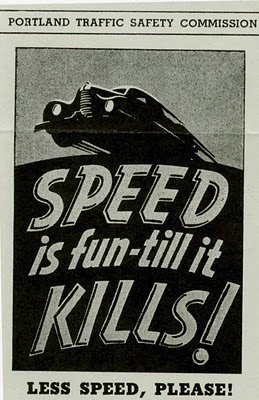



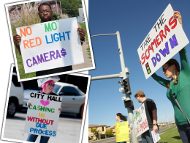
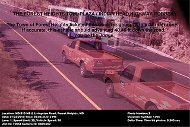

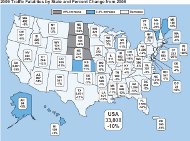
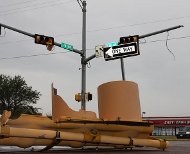













Recent Comments